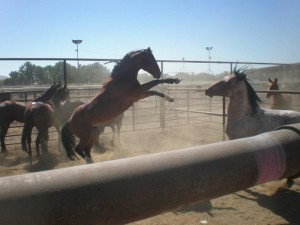
Wild horses headed to auction in Fallon, NM. Lifesavers bought them so they wouldn't be slaughtered. / Lifesavers Wild Horse Rescue
Lifesavers Wild Horse Rescue did it again: they scooped up another 100 horses that were about to be auctioned off to Mexican slaughter houses this weekend. After saving 172 wild horses from auction in June, the horse charity went back to the Fallon, NM, auction house and bid on more this weekend. They expected 175 horses on the block, but only found 105. With the help of other private buyers, they managed to save 100 of them, president Jill Starr announced on the group’s Facebook page this weekend.
The average price was expensive: $375 per horse. Of course, that’s only the beginning. A vet check will run about $100 and after that it’ll cost about $100 a month to keep a horse. No one is sure where the horses came from, which made Jill suspicious.
The Bureau of Land Management (BLM) is supposed to watch out for the nation’s horses, but they’ve always been conflicted caretakers. Their full-time whose full-time job is managing public land at cheap prices for ranchers. To accommodate ranchers, it has been cutting back on the horse’s range and numbers all along. The BLM lets 33,700 of its wild horses actually live in the wild. Another 8,800 live in corrals and 25,700 in Midwestern pastures, at a taxpayer cost of $29 million a year.
Wild horses have special federal protection. They can’t be sold at auction unless the buyer promises basically not to slaughter them right away. So the BLM has been claiming that some of these horses running around like wild are really imposters, stray horses that just turned up en masse on public lands. And they were clever, too; they picked lands where wild horses used to be (until the BLM cleared them out).
In June the BLM put those 172 horses up for auction claiming they were “estrays”–horses some rancher just set loose. ”
Jill says the June group did have some horses that were clearly let loose from a ranch, but many more that were just as obviously wild mustangs.
“Some look like big red quarterhorses…and are very adoptable. They’re cute and able to get tamed up pretty well,” she says. “These other ones are just Spanish Mustangs, you can see it….We definitely recognize some of them that have no business being around people. That herd was pretty isolated. They had very little awareness of people. They are scared to death, to the the point they will risk their own life to not have to deal with us.”
The ASPCA says there’s a chance that shipping horses overseas for slaughter and human consumption will get outlawed thanks to a bill by Representative Jim Moran (D-VA). Prevention of Equine Cruelty Act (H.R. 503) bans shipping horses across state or national borders for slaughter. It has 184 bipartisan cosponsors but needs to get a date for a vote on the house floor.
The USDA currently charges $70 for every horse going to Mexico–unless the equine is just going to slaughter. For horses destined to become meat, the USDA charges $5.50. The agency has been going through a long process of raising fees, but the killer buyers have gotten off very easy. Their fee will only go up 10% over three years. One easy way to cut down on horse slaughter: just raise the fee.
Where to go to see wild horses
Help Out Lifesavers Wild Horse Rescue

horse slaughtering and more is afective just because government doesnt want to take care of them some humans do. Why is governement worried about where wild horses run it was there land before ours therefore they should worry about other things thats more importanat
[…] Adopt A Horse | Cart Horse Protection Association |National Wild Horse Adoption Day Horse for adoption :ALove4Horses.comNEEDING HELP: HORSE PROTECTION ASSOCIATION OF FLORIDA | OcalaliciousAdoptaPet.com Blog farm animal adoption horse rescue | Adoption Blog 18 wild horses adopted at Honor Farm auction : Cowboy State Free PressAnother 100 Horses Saved From Auction Sale to Mexican Slaughterhouse | AnimalTourism News […]